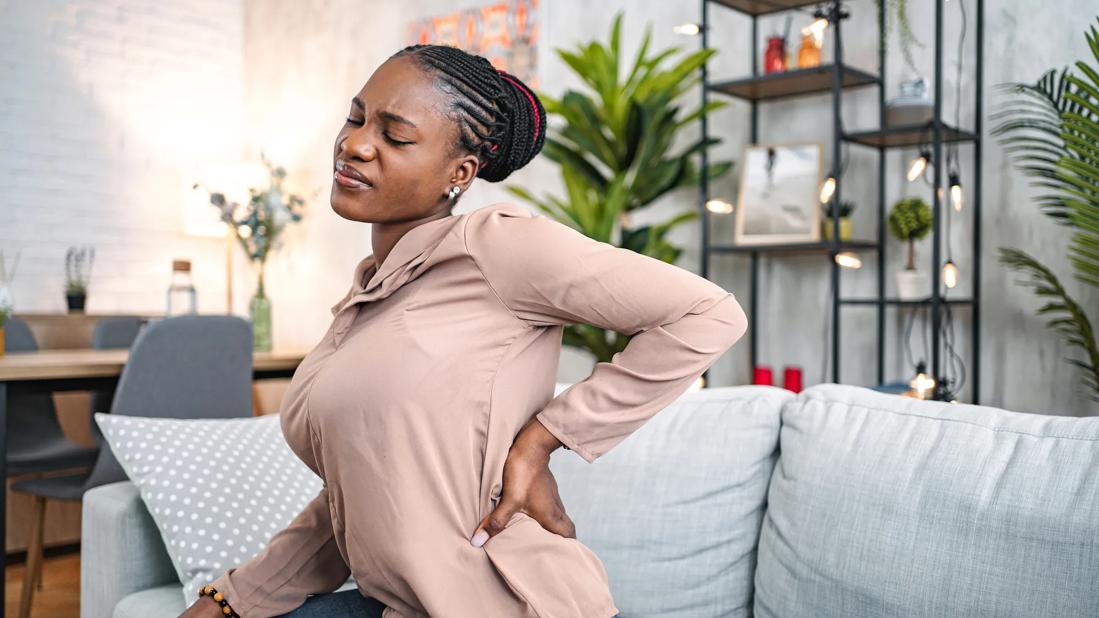It might be, but it’s more likely that your symptoms of constipation and back pain are caused by underlying conditions

Image content: This image is available to view online.
View image online (https://assets.clevelandclinic.org/transform/b8136876-8d29-407f-a18a-66782cd394ea/lower-back-pain-1573801530)
Person sitting on couch at home, with hand on lower back, grimacing
When two symptoms occur at the same time, it makes sense to suspect they’re connected. Could one be causing the other? Could both be symptoms of a separate condition?
Advertisement
Cleveland Clinic is a non-profit academic medical center. Advertising on our site helps support our mission. We do not endorse non-Cleveland Clinic products or services. Policy
When it comes to constipation and back pain, the answers are yes. “Constipation may cause back pain,” says nurse practitioner Bryn DeSantis, CNP. “But more often, chronic conditions are the source of both symptoms.”
DeSantis explains the complex relationship between constipation and back pain and shares how to find relief.
Individually, back pain and constipation are common conditions affecting millions of people every year. Having them at the same time could easily be a coincidence. But there may be more to the story.
A large amount of poop (stool) in your colon can put pressure on nerves in your lower spine. “If this happens, you might feel a dull, achy pressure in your lower back,” shares DeSantis.
A more severe form of constipation called fecal impaction can sometimes cause back pain. Fecal impaction is when a dry, hard lump of stool gets stuck in your rectum. This often occurs as a result of decreased mobility, neurological disorders or as a side effect of certain medications. Symptoms of fecal impaction include:
Advertisement
If you have these symptoms, contact a healthcare provider right away. Fecal impaction requires immediate treatment.
Most of the time, constipation doesn’t directly cause back pain. When you have back pain and constipation together, the more likely scenario is that both are caused by different but often related conditions.
Irritable bowel syndrome (IBS) is a type of central sensitization syndrome. Central sensitization causes an increase in nerve signaling to your brain that heightens pain sensations. It’s like your nerves are being extra chatty with your brain, says DeSantis.
In IBS, the nerves in your gut are hypersensitive, causing constipation, diarrhea or both. Although not typical, IBS can sometimes cause lower back pain.
“The source of back pain in IBS isn’t clear,” notes DeSantis. It may be referred pain that starts in your gut, but you feel it in your back. More commonly, people with IBS may also have other chronic pain conditions, including:
Neurologic diseases like Parkinson’s disease and multiple sclerosis affect your nerves and muscles. This means they can affect the nerves in your gut that directly impact the speed and flow of your body’s waste, as well as the nerves in your back and spinal cord. Among other symptoms, people with these conditions may experience:
Spinal tumors can press on nerves, causing pain or slowed digestion. A similar situation can occur with large tumors in your lower abdomen as a result of:
The medications used to treat back pain-related diseases can also affect bowel function.
“Constipation is a very common side effect of pain relievers and muscle relaxants,” states DeSantis. “Medications for Parkinson’s disease can also trigger or worsen constipation.”
Back pain may affect your ability to exercise, says DeSantis. And a lack of exercise can contribute to constipation.
To determine if your back pain is due to constipation or another reason, a provider will review your symptoms and medical history. They typically want to know if you:
Advertisement
If constipation is causing your back pain, try some constipation-relief home remedies like:
Your provider may also suggest more intensive treatments, such as:
For pain relief, DeSantis warns against using over-the-counter pain relievers, which can sometimes make gastrointestinal symptoms worse. Instead, try these home remedies for back pain:
If you have back pain and constipation that last longer than a few weeks, call a healthcare provider who can take a closer look at what’s happening with your body. Other signs that you should seek immediate medical care include:
Advertisement
Back pain and constipation aren’t fun — and having them together can be even more challenging. When these problems interfere with your life, it’s time to get help. Your provider can determine what’s going on and recommend ways to get you and your bowels moving again.
Advertisement

Sign up for our Health Essentials emails for expert guidance on nutrition, fitness, sleep, skin care and more.
Learn more about our editorial process.
Advertisement
Drinking water, eating high-fiber foods and exercising are just a few of the ways to get back to your ‘regular’ self
From staying hydrated to staying on schedule, these tips can help you stay regular on-the-go
Developed in the 1800s, this remedy remains a viable solution today
Prunes earn the title of ‘nature’s remedy’ for bowel movement issues
Stool softeners are a type of laxative that softens your stool, making it easier to poop
A dietitian weighs in on social media’s popular constipation recommendation
Eat foods high in fiber, drink water and consider using a laxative
It could be diet or it could be something else
Although it could be used as a moisturizer, this new trend is not recommended
Communicating clear limits helps protect your time, energy and emotional well-being
High cholesterol can be genetic, but testing and treatment can lower your heart disease risk